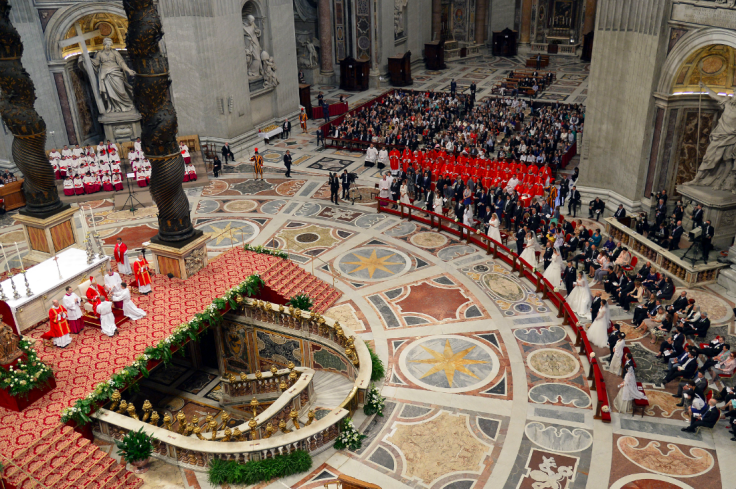Vatican Gay Rights: Synod Document Considered "Groundbreaking" For LGBT Catholics

Pope Francis and other Roman Catholic leaders from around the world released a 12-page document Monday calling for the Catholic Church to consider welcoming gay people, unmarried couples, divorced and remarried persons and the children of these unconventional families into their local church communities. The preliminary document has been hailed as a "groundbreaking" embrace of gay Catholics while also raising questions about the role of the church in the ongoing global debate on expanding gay rights.
“It is the task of the church to recognize those seeds of the world that have spread beyond its visible and sacramental boundaries,” the document reads. “The church turns respectfully to those who participate in her life in an incomplete and imperfect way, appreciating the positive values they contain rather than their limitations and shortcomings.”
The document is a midway report of the third Extraordinary General Assembly of the Synod of Bishops, which began Oct. 5 in Rome and marks a rare gathering of church leaders aimed at discussing modern morals. A section titled “Welcoming homosexual persons” in Part III of the document reads: “Homosexuals have gifts and qualities to offer to the Christian community.”
The Human Rights Campaign called the Vatican document “potentially groundbreaking,” and praised the assembly of bishops in a press release Monday for using inclusive language when referring to the LGBT community. “For the LGBT Catholics in the United States and around the world, this new document is a light in the darkness,” HRC President Chad Griffin said in a statement.
Ross Murray, a GLAAD spokesperson, said the discourse is a “ray of hope,” but noted “it remains to be seen whether this change in tone will translate into a real change in the church’s interaction with LGBT people.”
Monsignor Raymond Kupke, who teaches church history at Seton Hall University, said the Vatican document is not a decree but a platform for discussion, and no formal decisions will be made until 2015. Still, it raises significant debate about how the church interacts with members who are involved in so-called sin without accepting the sin itself, he said.
“It’s looking to see how the church can be inclusive of different situations without necessarily watering down church doctrine,” Kupke said.
Lisbeth Melendez Rivera, director of the Catholic Initiative for the Human Rights Campaign, said while there was still much more work to be done, this is a time for celebration and not pessimism. “This was as if the skies had opened and angels were singing,” Rivera said.
Rivera said Francis is making small but noteworthy changes to the rhetoric of the Catholic Church, which once labeled homosexuality “intrinsically immoral” and “objectively disordered” under his predecessor Pope Benedict XVI in 2005. “This is by no means an end. This is literally very small steps. But in the context of the church, it’s gigantic,” she said.
Although Francis is not the head of Christianity, his role as the leader of the Roman Catholic Church impacts 1.5 billion of the church's faithful. Change led by Francis and the Catholic Church signifies change is possible for Christianity and other faiths, including historically conservative religions such as evangelical and Islam, Rivera said.
Rivera said the preliminary document also indicates the beginning of a path toward healing for the LGBT community. "When Benedict spoke about our inherent defect, it literally caused you to cringe and retreat on yourself,” she said. “We are not a product, and we are not garbage. We’re human beings.”
© Copyright IBTimes 2025. All rights reserved.





















